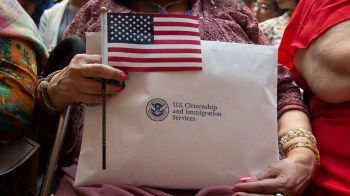‘Silent raids’ focus on employers, not workers
TEXT OF STORY
Kai Ryssdal: One of the arguments that comes up when people start talking about illegal immigrants is that they’re taking jobs that American citizens would otherwise do. At least in agriculture, that argument doesn’t hold. The Associated Press has been running through some federal farm worker data. In California, for instance, just a couple of hundred people — 233 to be exact — have applied to fill more than a thousand farm labor jobs since the beginning of the year.
Since the Obama Administration took office, it has changed the way the government goes looking for illegal immigrants on the job, too. Instead of trying to track down the workers themselves, the feds go after companies now. The official line from Washington is that that reduces the supply of jobs that will attract undocumented workers to begin with.
Marketplace’s Jeff Tyler explains.
Jeff Tyler: The government raids fewer factories to arrest undocumented workers. Now it scrutinizes more paperwork in what are known as “silent raids.” Basically, they’re audits conducted by the feds through Immigration and Customs Enforcement. They snoop through computer files and study I-9 employment eligibility forms. When agents find problems, they notify the employer. It’s then the employer’s responsibility to fire workers using fake IDs.
Brett Dreyer oversees the immigration agency’s workplace enforcement.
Brett Dreyer: This year, we have initiated over 2,600 investigations of employers, which is triple the amount we were doing just three or four years ago.
The agency has arrested 170 employers this year and issued more than $5 million in fines related to I-9 inspections. But Dreyer says the agency is selective about who it targets.
Dreyer: We want to go after the egregious employers who are hiring undocumented workers, making it a business practice to hire undocumented workers, making it a pattern of practice. That is our priority.
One of those alleged “egregious employers” is a chef in San Diego. Michel Malecot owns a restaurant and catering operation called The French Gourmet. He has more than 100 people on staff, who cook up…
Michel Malecot: From braised short-ribs to a wonderful filet mignon to fish with a macadamia nut.
The immigration agency alleges that Malecot repeatedly hired people he knew were working in the country illegally. When he goes to court in November, Malecot faces up to 30 years in prison, millions of dollars in fines and the forfeiture of his business.
Gene Iredale is his lawyer.
Gene Iredale: The government says that because the building was used and people worked inside the building, the building is subject to forfeiture. What we say is that the forfeiture laws are being abused in this case, that they are designed to go after people who sell crack, not creme brulee.
He says his client made a good-faith effort to follow what Iredale calls a confusing and sometimes contradictory law. He believes the government is using the case to send a message to the restaurant industry.
Iredale: If you harshly and excessively punish one person, it will deter or frighten other people in that same position. And therefore the government gets more deterrent bang for its law enforcement buck.
The feds won’t comment on an ongoing case. But Dreyer would say that, in general, the government wants to be seen as a partner, not an adversary.
Dreyer: The federal government can’t go this alone. We have to partner with private industry, with the employers in our country.
Some business leaders contend the government isn’t trying hard enough to be a good partner. In the construction industry, contractors fear they’ll be held responsible for the hiring practices of sub-contractors.
Brian Turmail is spokesman for The Associated General Contractors of America.
Brian Turmail: This administration tends to default to the assumption that businesses have done wrong. That if anything has happened, it’s generally the business’ fault.
Trade associations like his caution members to double-check their employment records. Immigration lawyers like Terry Olsen in Chattanooga, Tenn., help companies audit their paperwork. He charges $5,000 to $10,000 for the service.
Olsen argues it’s better to be safe.
Terry Olsen: Managers and HR people are actually going off to jail now.
While employers maneuver to protect themselves, the big question remains: How effective is the policy in keeping illegal immigrants out of the work force? Migration experts say they don’t have hard numbers yet. But they say the audits are far more effective than the old strategy. Raids on factories are dramatic, they say, but audits find more people who are working illegally.
I’m Jeff Tyler for Marketplace.
There’s a lot happening in the world. Through it all, Marketplace is here for you.
You rely on Marketplace to break down the world’s events and tell you how it affects you in a fact-based, approachable way. We rely on your financial support to keep making that possible.
Your donation today powers the independent journalism that you rely on. For just $5/month, you can help sustain Marketplace so we can keep reporting on the things that matter to you.


















